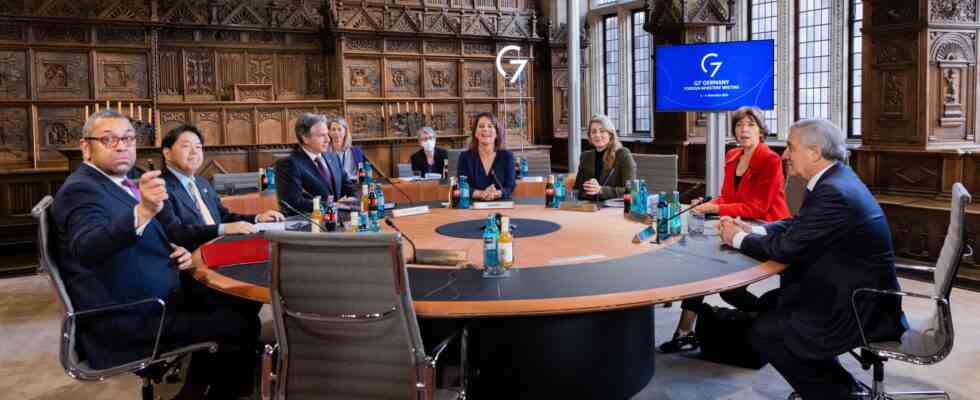Status: 11/04/2022 4:22 p.m
The G7 have warned Russia against a further escalation of the war against Ukraine and in particular condemned President Putin’s nuclear threats. The ministers also sharply criticized Iran for the violence against demonstrators.
The seven leading industrialized countries (G7) have warned Russia against using nuclear weapons in Ukraine. Any use of chemical, biological or nuclear weapons would have serious consequences, the G7 foreign ministers announced at the end of their meeting in Münster. “Russia’s irresponsible nuclear rhetoric is unacceptable.” We also condemn the recent attacks on civilian infrastructure in Ukraine. According to the G7, drones and trainers from Iran were also used in the Russian airstrikes. Any country, individual or entity that assists Russia in its war of aggression will continue to be sanctioned, the joint statement said.
In addition, the G7 foreign ministers announced joint measures to repair critical infrastructure in Ukraine. To this end, they agreed on the establishment of a coordination mechanism. In view of the massive Russian airstrikes on Ukraine’s energy and water supply, for example, this will be a focus of the G7 group’s work in the coming days and weeks, said a representative of the US State Department. The aim is to restore, protect and repair critical energy and water infrastructure in cooperation with the government in Kyiv. According to Federal Foreign Minister Annalena Baerbock, 30 to 40 percent of Ukraine’s energy infrastructure has been destroyed. Children were at risk of freezing to death this winter, she said at the start of the meeting on Thursday.
Germany currently holds the G7 presidency. In addition to the Federal Republic of Germany, the G7 also includes the USA, Canada, Japan, Great Britain, France and Italy.
Sharp criticism of the violence in Iran
With regard to Iran, the G7 group sharply criticized Tehran’s actions against demonstrators and the arms deliveries to Russia. “The brutal and disproportionate use of force against peaceful demonstrators and children is condemned,” says the final document on the two-day deliberations. The Iranian authorities are called on to “ensure that the perpetrators of human rights violations and abuses are held accountable”.
New sanctions are not announced in the paper, but the G7 are threatening further sanctions. The statement said the G7 would continue to impose economic costs on Russia and other countries, individuals or organizations that provide military support to Moscow’s war of aggression, as several of us have already done in relation to Iran’s supply of unmanned aerial vehicles to Russia to have”. The EU, among others, had already decided on sanctions against Iran in October for supporting the Russian war against Ukraine.
Among other things, the G7 are demanding that Tehran immediately stop arms deliveries to Moscow. “We strongly condemn Iran’s continued destabilizing activities in and around the Middle East,” it said. These included Iran’s activities “with both ballistic and cruise missiles” and with drones, as well as “the transfer of such advanced weapons to state and non-state actors”. Such a spread would destabilize the region and escalate “the already high tensions”.
China urged to peaceful solution
In the Taiwan conflict, the G7 ministers called on China in clear words for a peaceful solution. “We reaffirm the importance of peace and stability across the Taiwan Strait and call for the peaceful resolution of cross-strait problems,” the closing statement said. “We remind China of the need to uphold the principles of the UN Charter for the Peaceful Settlement of Disputes and to refrain from threats, coercion, intimidation or the use of force.” , including the one-China policy, it said. Chancellor Scholz made a similar statement during his visit to Beijing.
Beijing has repeatedly threatened to take the island’s democratic republic militarily if the Taiwanese resist peaceful “unification”. The communist leadership regards the island as part of the People’s Republic. Taiwan, on the other hand, sees itself as independent. “We reject all unilateral attempts to change the status quo through violence or coercion,” the G7 said.
At the same time, the foreign ministers emphasized that they would strive for “constructive cooperation with China” insofar as this was “possible and in our interest”. This applies in particular to global challenges such as peace and security, global health, the climate crisis and the conservation of natural resources. These could only be successfully overcome through cooperation within the framework of the rules-based international order.

